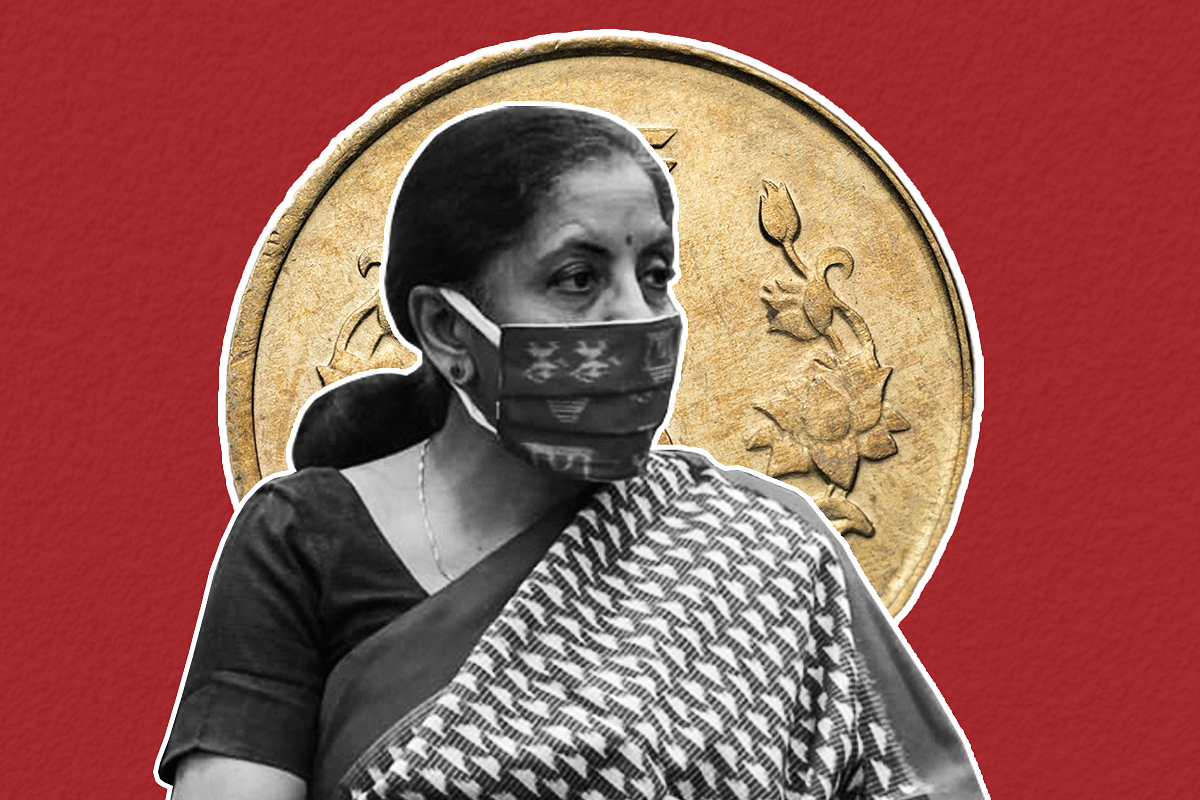News Brief
Bill To Privatise Two Public Sector Banks To Be Brought This Session; Here Are Details
- In the ongoing Winter session of the Parliament, the Banking Laws (Amendment) Bill 2021 will be introduced to privatise two public sector banks.
- While the centre is yet to announce the name of the two banks, NITI Aayog has recommended the sell-off of Indian Overseas Bank and Central Bank of India to the core group of secretaries on disinvestment, headed by Cabinet Secretary.

Union Finance Minister Nirmala Sitharaman. (Illustration: Swarajya Magazine)
The Winter session of Parliament, which started yesterday (29 November) will also see the introduction of the Banking Laws (Amendment) Bill 2021 aiming to privatise two public sector banks. The Bill is among the list of 26 such proposed legislations which are scheduled to be introduced during the session.
During the Budget 2021-22 speech, Finance Minister Nirmala Sitharaman had announced the privatisation of two public sector banks as part of the government's aim to garner Rs 1.75 lakh crore in the current fiscal year via disinvestment.
The purpose of the Bill states that in order to privatise the two public sector banks, amendments need to be made in Banking Companies (Acquisition and Transfer of Undertakings) Acts, 1970 and 1980, along with incidental amendments to the Banking Regulation Act, 1949. These laws had led to the nationalisation of banks, therefore, their relevant provisions have to be changed to pave the way for privatisation.
The Banking Laws (Amendment) Bill 2021 is listed for introduction, consideration as well as passing during the forthcoming Winter session, NDTV quoted official sources as saying.
The Bill is expected to lower the minimum government holding in public sector banks (PSBs) to 26 per cent from 51 per cent. While the centre is yet to announce the name of the two banks, on 24 November, the shares of Indian Overseas Bank (IOB) and Central Bank of India dropped, amid speculations that, as per the suggestion of NITI Aayog, the government had made a decision to privatise them.
Currently, the process of strategic disinvestment—sale of substantial portion of government shareholding in identified central public sector enterprises (CPSEs), up to 50 per cent or more, along with transfer of management control—is undertaken through a consultation process among different ministries and departments, including NITI Aayog.
The NITI Aayog identifies the CPSEs for strategic disinvestment and advises on the mode of sale, percentage of shares to be sold, and method for valuation of the enterprise. Its recommendations are considered by the Core Group of Secretaries on Disinvestment to facilitate a decision by the Cabinet Committee on Economic Affairs and to supervise the implementation.
Currently, the NITI Aayog has already recommended the sell-off of IOB and Central Bank of India to the core group of secretaries on disinvestment, headed by the Cabinet Secretary. This core group will send its recommendation to the alternative mechanism (AM), headed by the Finance Minister, for its approval. Finally, it will be cleared by the union cabinet. Only then, the Bill can be introduced in Parliament.
The government proposal to retain a 26 per cent stake in the PSBs may subdue the interest of the potential suitors. For instance, the government's initial plan to hold at least 26 per cent in Air India didn’t elicit any response from investors and it was forced to put its entire stake on the block.
“..If it’s found, after consultations with investors, that they are not interested unless the government sells its entire stake in the select PSBs, the government is open to consider complete privatisation as well. But initially, it may opt for retaining a 26 per cent stake,” FT quoted a source as saying.
In the last session, the Parliament cleared a bill to facilitate the privatisation of state-run general insurance companies by removing the requirement of the central government to hold at least 51 per cent stake.
Support Swarajya's 50 Ground Reports Project & Sponsor A Story
Every general election Swarajya does a 50 ground reports project.
Aimed only at serious readers and those who appreciate the nuances of political undercurrents, the project provides a sense of India's electoral landscape. As you know, these reports are produced after considerable investment of travel, time and effort on the ground.
This time too we've kicked off the project in style and have covered over 30 constituencies already. If you're someone who appreciates such work and have enjoyed our coverage please consider sponsoring a ground report for just Rs 2999 to Rs 19,999 - it goes a long way in helping us produce more quality reportage.
You can also back this project by becoming a subscriber for as little as Rs 999 - so do click on this links and choose a plan that suits you and back us.
Click below to contribute.
Latest